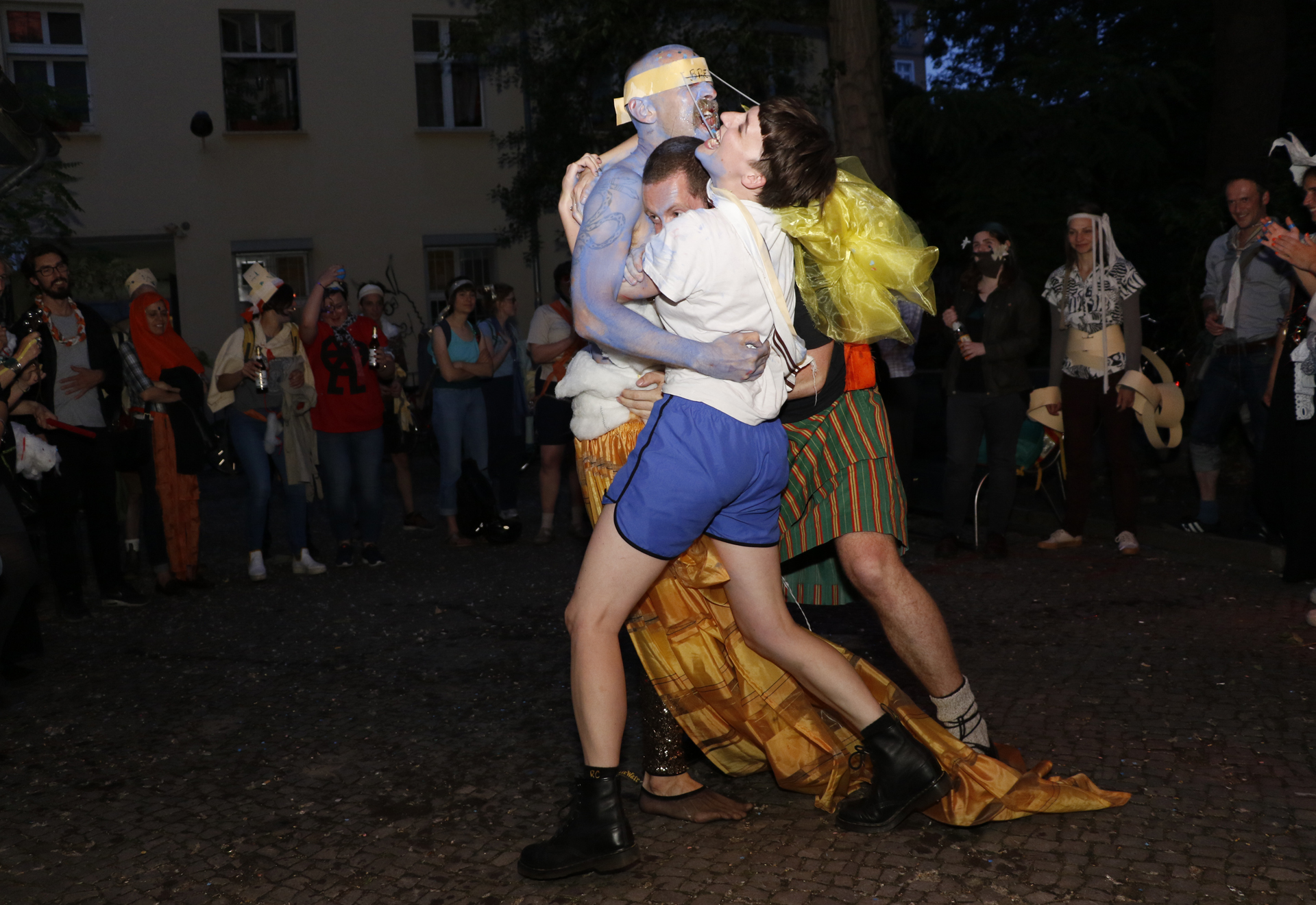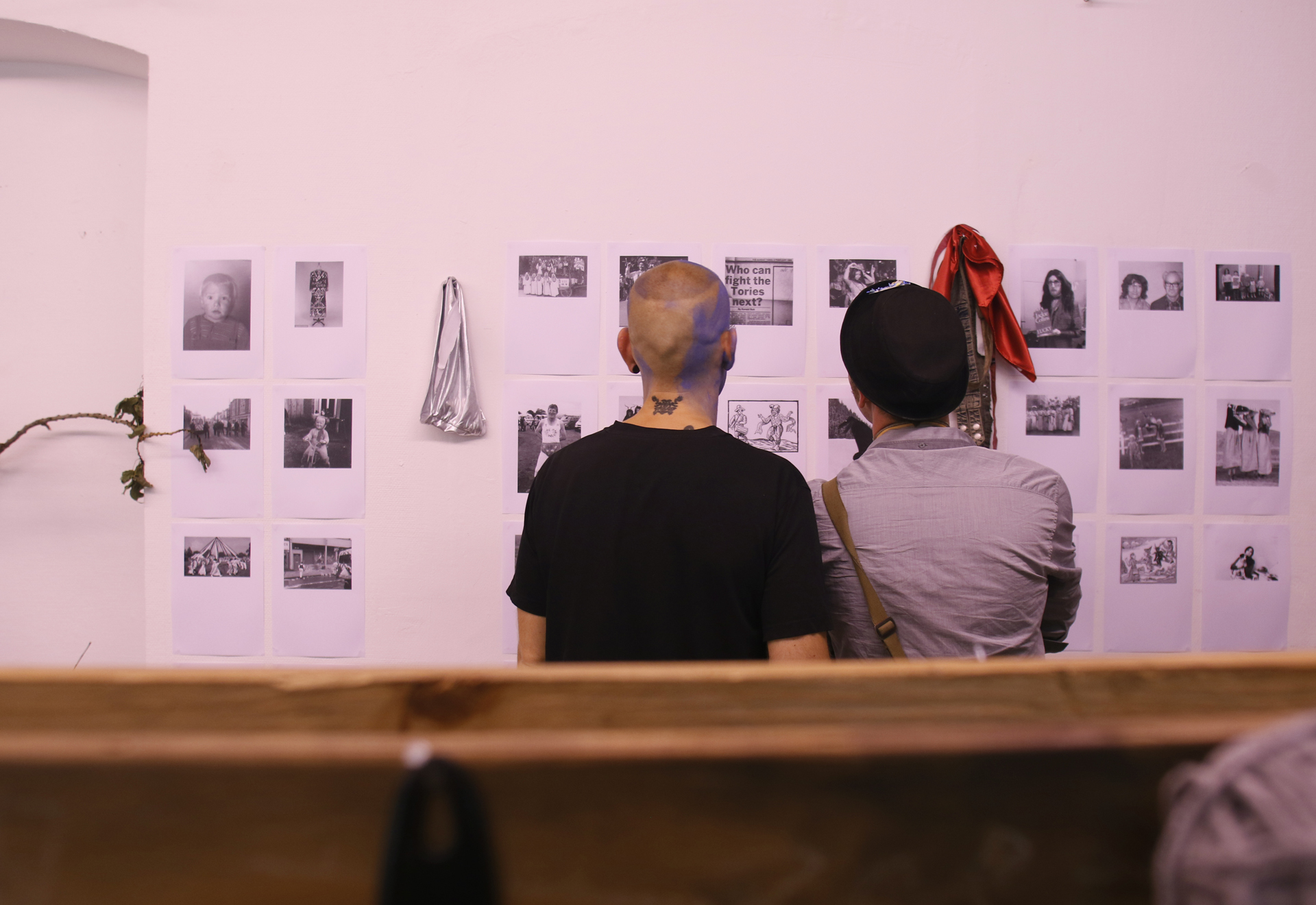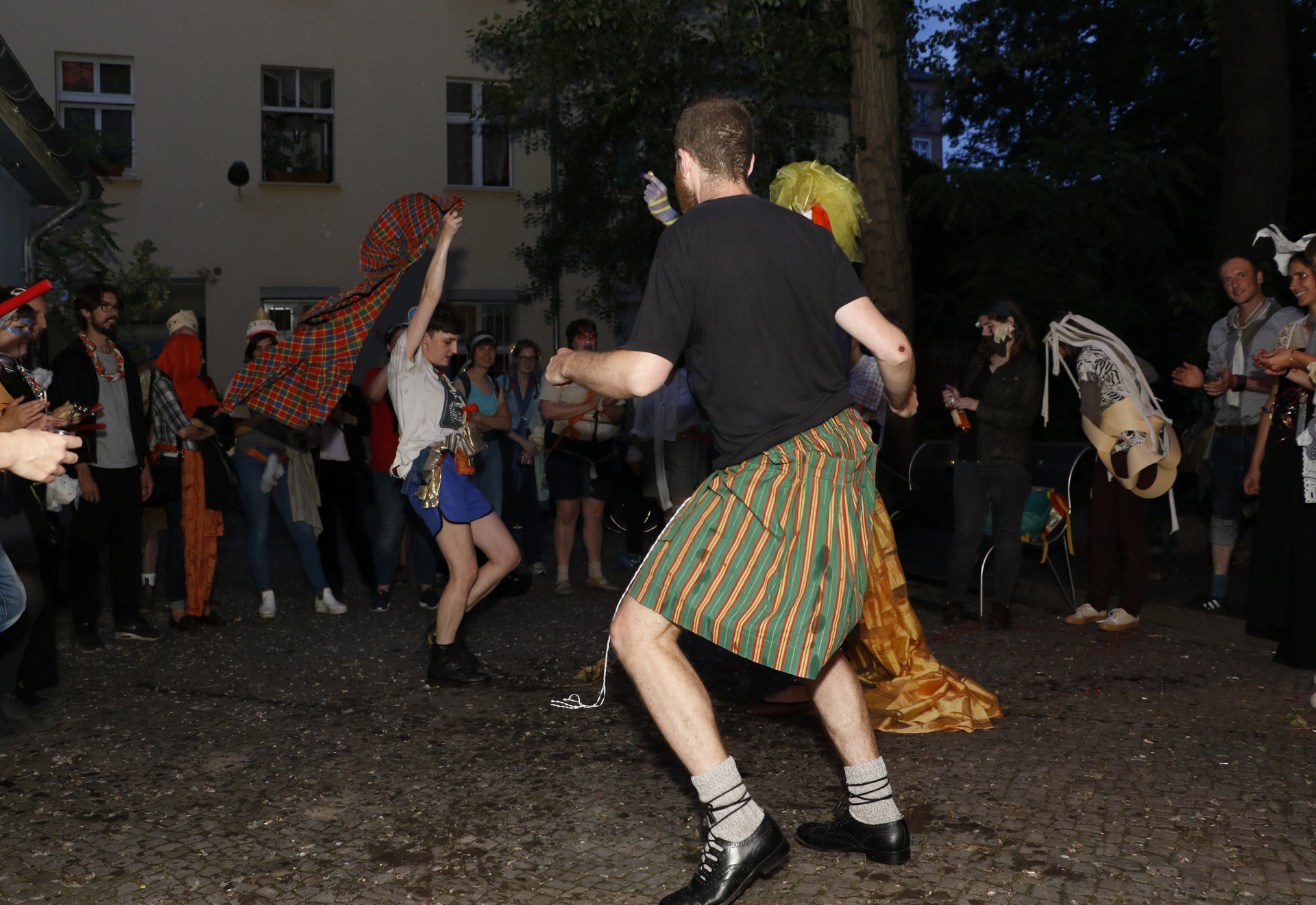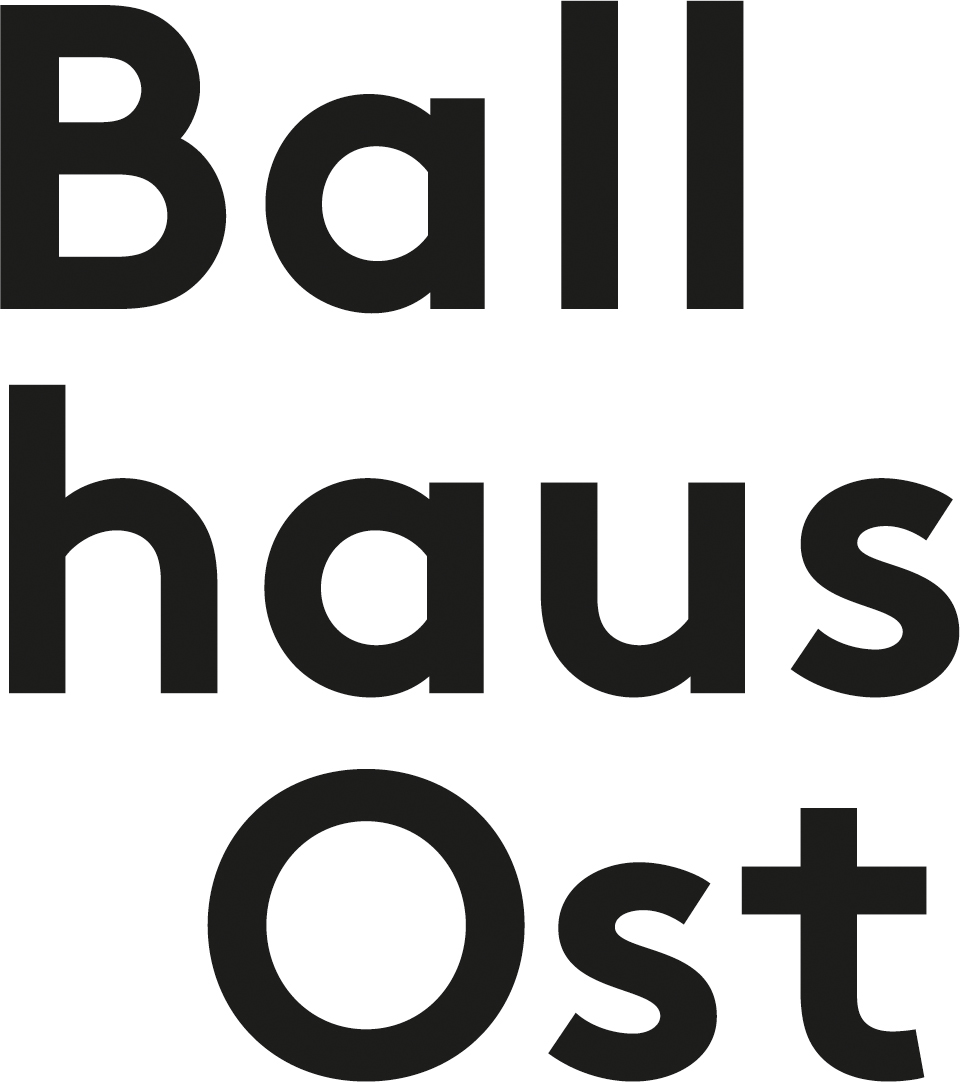We Need To Talk About Britain
A Vigil for Brexitland
Format: Performance
Premiere: 23 Jun 2017
Venue: Ballhaus Ost
Language: English, German
Duration: 75 min
Premiere: 23 Jun 2017
Venue: Ballhaus Ost
Language: English, German
Duration: 75 min
Direction, text, performance, design: Rachael Clerke, Chris Gylee, Aslan
Photography: Si Wachsmann, Rainer von Dziegielewski
Kindly supported by: Ballhaus Ost; artists and activists
It’s exactly one year since the UK voted by 52% to 48% to leave the EU. Queer performance collective ONCE WE WERE ISLANDS and Rachael Clerke invite you to stay up late with us at Ballhaus Ost and help bury the demons of this last year. We invite you to a Brexorcism; a Shame Party, a Divorce-iversary; a Drunken Wake; Exiles Anonymous. Some inverted, twisted sibling of Eurovision.
Hold our anxious hands while we make an attempt to move on, to process this shit, to enact some DIY therapy, or a weak-lunged, asthmatic, battle-cry of anger and hope. There will be singing and dancing, wigs and whisky, puddings and punk.
We can’t do it without you.
We can’t do it without you.




A RESPONSE
Growing up in Hanover, I felt quite close to the UK. Especially in the 1970s, the city had a charming British touch to it - such as its visible pride in being connected to the Crown through the Hanoverian line, King George V, the iron fences in my street, the pubs that became fashionable, the little Tee-Stübchen, and last but not least the Rhein Army and the punks and skinheads. We felt a strong connection towards the islands and had British teachers from whom we learnt English, and how to give speeches standing on a stool.
In We Need To Talk About Britain all these notions that I have about the UK were in tune with one another - except maybe the image of Great Britain as coloniser and conquerer. I found myself looking at Chris, Aslan and Rachael representing the clichés one might have about their country, but in a good way. The first room I entered was a lot of fun. It represented for me the creativity of British fashion - a mixture of royalty, paganism and working-class style. We were all more than happy to take part, dressing ourselves up as something that we felt was one of these things - without even mentioning it. There were colours, pieces of cloth, twigs with leaves on, and a lot of little things to cut and tie together. That’s what our world is made of, especially when it comes to the UK - it’s a place that found its way of life by taking things from all over the world, like pirates and treasure hunters coming back with all the good things like coffee, tea, silk, cotton and tobacco (another cliché I suppose).
In the next room Chris was reading to us. We heard stories about separation. I was reminded of the song 50 Ways to Leave Your Lover by Simon and Garfunkel. We heard sounds of joy and excitement coming from the other two rooms and the other groups, and it felt like being in school and missing out on the pleasure, laughs and amusement others had. But I also felt that listening to a reading and hearing voices and music coming from somewhere else made it so much more lively than it would have been in a quiet atmosphere. Chris was wearing black brogues with the laces tied up around his ankles and a skirt that was reminiscent of tartan. He blinked and his eyes tingled with excitement - as if we were all part of a little conspiracy - as if there was something we were about to find out - soon - if we were patient and looked deep inside our hearts.
In We Need To Talk About Britain all these notions that I have about the UK were in tune with one another - except maybe the image of Great Britain as coloniser and conquerer. I found myself looking at Chris, Aslan and Rachael representing the clichés one might have about their country, but in a good way. The first room I entered was a lot of fun. It represented for me the creativity of British fashion - a mixture of royalty, paganism and working-class style. We were all more than happy to take part, dressing ourselves up as something that we felt was one of these things - without even mentioning it. There were colours, pieces of cloth, twigs with leaves on, and a lot of little things to cut and tie together. That’s what our world is made of, especially when it comes to the UK - it’s a place that found its way of life by taking things from all over the world, like pirates and treasure hunters coming back with all the good things like coffee, tea, silk, cotton and tobacco (another cliché I suppose).
In the next room Chris was reading to us. We heard stories about separation. I was reminded of the song 50 Ways to Leave Your Lover by Simon and Garfunkel. We heard sounds of joy and excitement coming from the other two rooms and the other groups, and it felt like being in school and missing out on the pleasure, laughs and amusement others had. But I also felt that listening to a reading and hearing voices and music coming from somewhere else made it so much more lively than it would have been in a quiet atmosphere. Chris was wearing black brogues with the laces tied up around his ankles and a skirt that was reminiscent of tartan. He blinked and his eyes tingled with excitement - as if we were all part of a little conspiracy - as if there was something we were about to find out - soon - if we were patient and looked deep inside our hearts.
In the third room was Rachael, as if punk had never died. She represented everything that I associate with this era: a woman being butch and bold walking around with big steps and rendering the question of gender obsolete. The room was lit by one single light-bulb, which I found to be genius. Were there windows? No. There was fog coming from a machine and music from the Sham 69 - if the kids are united, then we’ll never be divided. So after the eloquent reading part there was the hooligan rumble. Under the naked light-bulb we were asked to hug - two by two - representing the UK and the EU. A third person representing Brexit was given the task of dividing this alliance. There were three bouts of wrestling but no-one succeeded in separating the huggers - neither by force, nor through a soft approach. I guess it would have been nice if Theresa May had been there, showing us the will she has to fulfill the wishes of her voters.
In the end we all gathered in the yard, all in disguise, joining in a ritual, drinking whiskey (ugh! bad Johnnie Walker) and throwing the rest at Chris, Aslan and Rachael. Recapitulating I can only feel grateful that we all have the opportunity to live in Berlin, being together and creating a new thing apart from the foggy nationalism of the administration of our ancestors. It will pass. And I wonder how our time of so many changes and opportunities will be called in future history.
Claudia Basrawi, 2017
In the end we all gathered in the yard, all in disguise, joining in a ritual, drinking whiskey (ugh! bad Johnnie Walker) and throwing the rest at Chris, Aslan and Rachael. Recapitulating I can only feel grateful that we all have the opportunity to live in Berlin, being together and creating a new thing apart from the foggy nationalism of the administration of our ancestors. It will pass. And I wonder how our time of so many changes and opportunities will be called in future history.
Claudia Basrawi, 2017



A RESPONSE
(TO THE FIRST RESPONSE)
We talked over these 9 days about feeling dislocated, and about our tricky relationships to home and to Britain. Different for all of us, but we identified a shared desire to live in and across the world, with new people and communities. Tokyo, Istanbul, Tanta, Granada, Berlin. Citizens of Nowhere, products of the EU's Freedom of Movement. None of us strongly identify as British. Rachael would say she is Scottish, an identity she re-connected with during the independence referendum. For Aslan and I, there's a shame or aversion to saying we are English, certainly. British also. We tend to say we come from the U.K. Or Richard would say London, being born in the most cosmopolitan city in the country. There's something we're running from that's rooted in the places where we grew up, the long colonialist history, the damp and despair of the Islands. We wrote provisional speeches for the end of the performance, and I visualised the long journey home from Berlin, trying to imagine for each of us the heavy steps it would take to leave for the last time and to have to return to our birthplaces, the houses we grew up in as children, the towns we escaped from and haven't returned to. It became clearer to me, that as a group of queer artists, this relationship to home is common to us all. Rachael still goes drinking in Leith, but as a mark of defiance or celebration at having survived growing up in that place. I wonder what it would be if Theresa May could remove this free choice we have to live where we please, and instruct us to return to the streets and drab buildings of our childhoods. If the isolationists get their way, and enforce everyone to stay just where they are meant to be, satisfied with the logical end-point of their ideology.
I think about being back in the nothingness of the small town, the four streets grouped as a square, a green field in the centre, trees that were tall to climb as small bodies, but perhaps only number ten in total, plus a solitary weeping willow, with leaves hanging down low into the grass. So, with this in mind, I find it very interesting that Claudia identified such strong facets of British identity or cliché in the piece, and especially in our bodies. Three examples of Britishness. I was surprised to read this, but with that same sort of inevitable surprise when someone tells you (once again) that you look just like your parent. Perhaps there are some things in your DNA that you can never get away from. It makes me curious to know what we chose consciously, or more unconsciously, to retain when we left. What stays with you when you move on? What actions become rituals? I have a shy sort of curiosity to wonder now what we might have brought with us from the Islands, trapped in our cells and follicles, in our eyes, in the way we strut around the room, or clatter down the staircase. Like Claudia, I also wonder about this 'new thing' that we are creating together here in Berlin, and how it will evolve. If and how this 'foggy nationalism' will become a strange moment in time, and what our evident entanglement with each other here in this city will produce; new ceremonies, ways of being together, homes, families, futures. How this will survive.
Chris Gylee, 2017
Chris Gylee, 2017


The above images include photographs by Si Wachsmann.
We Need To Talk About Britain is a ONCE WE WERE ISLANDS and Rachael Clerke production in cooperation with Ballhaus Ost.
Additional thanks to: the team at Ballhaus Ost; Claudia Basrawi; Sylvie McGowan; Trent Pehrson; Rainer von Dziegielewski.
We Need To Talk About Britain is a ONCE WE WERE ISLANDS and Rachael Clerke production in cooperation with Ballhaus Ost.
Additional thanks to: the team at Ballhaus Ost; Claudia Basrawi; Sylvie McGowan; Trent Pehrson; Rainer von Dziegielewski.